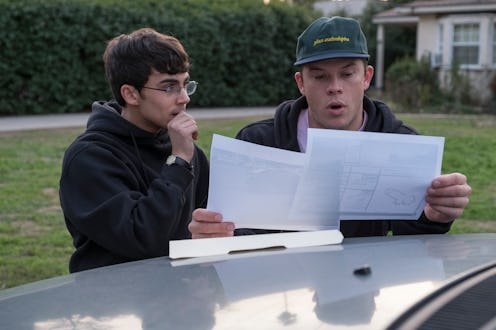Entertainment
Here's Why One Of Your Favorite Netflix Shows Almost Didn't Happen

It's a true crime parody, sans big-name stars, and the plot revolves around figuring out who drew a bunch of dicks on cars at a high school. Based on that description, would it surprise you to hear that, according to Vulture, Netflix's American Vandal almost didn't get made? The series — which debuted last summer and was quickly renewed for a second season — has become an unexpected hit for the streaming behemoth, despite initially getting shot down by a major Netflix executive.
In a June 10 interview with New York Magazine, Netflix's chief content officer, Ted Sarandos, explained how new series, films, and specials get approved from the top. "I’m building a team that’s oriented as saying 'Yes' in a town that’s built to say 'No,'" he said.
Sarandos continued, "Most of my team have more buying power than anyone has selling power in Hollywood. My direct-report team can greenlight any project without my approval. They can greenlight it against my approval!" he said.
American Vandal was one of those very projects that got greenlit against Sarandos' approval, according to the article. While Sarandos doesn't say what it was, exactly, that didn't peak his interest in the show from the start, the article notes that, "[he] kept telling the development team he didn’t think it made sense; they made it anyway, and now Netflix is working on a sequel."
Perhaps it was the tongue-in-cheek way the show's co-creators — Dan Perrault and Tony Yacenda, along with Funny or Die’s Joe Farrell — first pitched the idea that didn't make sense to Sarandos. Speaking at the ATX Television Festival in June, the creators explained how they came up with American Vandal, and how they pitched it. "We didn’t want to do a parody where we were making fun of true crime documentaries because we genuinely love them," Yacenda said, as reported by Variety.
So, instead of making the parody aspect of American Vandal clear from the start, "We went into pitches with a case file of evidence," Farrell said. "Dan Perrault would slowly push evidence across the table. …There was no wink in the pitch."
Yacenda added, "We have these major elements that are funny, but once that’s set, the approach is completely earnest. Let’s tell this real story, let’s tell this really tense documentary."
Clearly, their unique pitch approach ended up being a success, as did their idea for a true crime mockumentary. Not only that, but fans and critics alike have praised and defended the series for being "more than a dieck joke."
In October 2017 — shortly after the show debuted — a Vulture review by Kathryn VanArendonk noted, "American Vandal has a wildly variable tone that feels truer to the drastic, giddy emotional swings of teenhood, and especially by the end of the series, it rubs dizzy absurdity right up against intense, long-simmering pain."
The New Yorker, too, praised the show's take on teenage life shortly after the series was released. "American Vandal maintains momentum to an unlikely degree, thanks entirely to its subject matter: it’s the best show about high school that I’ve seen in years," Jia Tolentino wrote.
The show was so well-received, in fact, that the first season earned the creators a prestigious Peabody award. "The goal was always to make people laugh and to get people invested in this mystery, so the fact that people way smarter than us saw everything we were going for in our loftier ambitions was cool," Yacenda told the crowd at the ATX TV festival in June, as per Page Six.
American Vandal brought Netflix rave reviews, a Peabody Award, and at least two seasons of a hit comedy. That's pretty good for a show Netflix's chief content officer didn't want to take on in the first place.